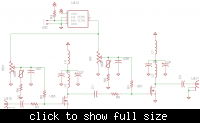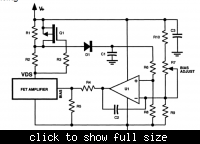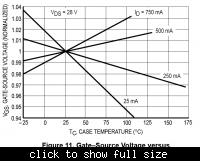mtwieg
Advanced Member level 6

For an experiment I've been running it turns out that the gain of my TX amplifier is drifting as it heats up, and it's throwing off my measurements. I'm seeing the output change by about -2dB as it heats up by about 20 degrees C. I'd like to knock this down to -0.2dB or something close.
The amplifier is a two stage class A using the MRF136, 64MHz, about 8W max. I'm already using NTCs to put some negative feedback from the transistors to the biasing network, but I think no matter how much I tune it, it'll still drift too much. They're really only there to prevent thermal runaway.
I was looking at DC source degeneration as an option, but I think that I'll need a pretty large resistance (like 10 ohms) to get what I need, so I'm looking at other options, like biasing with a DC current source. But even if I maintain a constant drain bias current, won't my gain still change a bit with temperature?
Also another requirement of my amp is that it must be able to shut down quickly. During a normal experiment I send out 30us bursts of RF every 300us, and the bias is off in between to save power. So any biasing scheme I use would have to have a settling time in the tens of microseconds.
Thanks in advance
The amplifier is a two stage class A using the MRF136, 64MHz, about 8W max. I'm already using NTCs to put some negative feedback from the transistors to the biasing network, but I think no matter how much I tune it, it'll still drift too much. They're really only there to prevent thermal runaway.
I was looking at DC source degeneration as an option, but I think that I'll need a pretty large resistance (like 10 ohms) to get what I need, so I'm looking at other options, like biasing with a DC current source. But even if I maintain a constant drain bias current, won't my gain still change a bit with temperature?
Also another requirement of my amp is that it must be able to shut down quickly. During a normal experiment I send out 30us bursts of RF every 300us, and the bias is off in between to save power. So any biasing scheme I use would have to have a settling time in the tens of microseconds.
Thanks in advance




